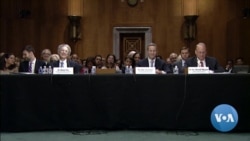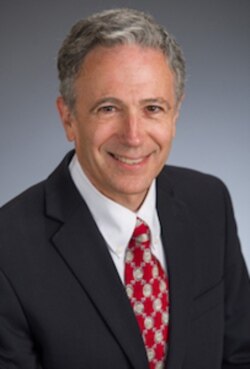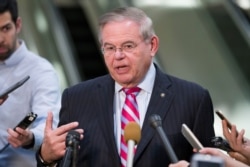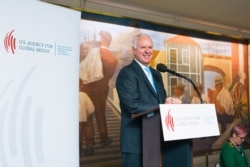Jesusemem Oni contributed to this report.
President Donald Trump's nominee to run the U.S. Agency for Global Media (USAGM) testified Thursday before the Senate Foreign Relations Committee, addressing concerns about whether he would seek to impose a political bias on government news agencies such as Voice of America, which is mandated by law to be objective and balanced in its reporting.
"The whole agency rests on the belief the reporters are independent, that no political influence is telling them how to report the news and what to say. Without that trust, I think, the agency is completely undermined," said Michael Pack, who was first nominated to head USAGM 16 months ago.
John Lansing, the previous USAGM chief executive officer who was appointed by former President Barack Obama in 2015, plans to resign at the end of September to become president and chief executive officer of National Public Radio, an independent, nonprofit public radio and media organization.
Political ties
Pack is a documentary producer who headed the conservative, California-based Claremont Institute and has worked for the U.S. nonprofit Corporation for Public Broadcasting.
In 2002, then-President George W. Bush nominated him to serve on the National Council on the Humanities. In the early 1990s, he led the WorldNet government television service, which later became part of VOA.
He also has ties to Steve Bannon, the former White House chief strategist for Trump and former head of Breitbart News, which is widely seen as an advocate for nationalist, conservative causes.
Pack and Bannon worked together on documentaries examining the Iraq War ("The Last 600 Meters") and nuclear power ("Rickover: The Birth of Nuclear Power").
In a 2017 article he wrote for The Federalist news site, Pack praised Bannon as "a successful conservative documentary filmmaker," while complaining of a liberal bias in the documentary film industry.
International broadcasting
With a budget of $808 million, USAGM oversees all government-funded news organizations that together broadcast to 100 countries and reach an estimated audience of 345 million people. Earlier this year, the organization changed its name from Broadcasting Board of Governors to the U.S Agency for Global Media.
These news networks include VOA, which broadcasts in more than 40 languages around the world; TV and Radio Marti, which broadcast to Cuba; Arabic-language networks Alhurra TV and Sawa radio; Radio Free Europe/Radio Liberty; and Radio Free Asia.
The VOA charter, signed into law in 1976, and the International Broadcasting Act mandate that all government-funded news agencies adhere to high journalistic standards that free-press advocates say are essential to be considered credible source of news to international audiences.
"You're not a state-run media that only tells one side of the story as often state-run media does in other countries," said Al Tomkins, who teaches journalism ethics at The Poynter Institute, an organization that promotes press freedom and provides journalist training.
David Jackson, a VOA director in the early 2000s, says there is long-standing, broad support for the agencies' journalistic mission from both Democrats and Republicans in Congress.
"Members of Congress have always supported the broadcasting by VOA and the other broadcasters because they recognize the value of having one source of news that people around the world can rely on," he said.
Political interference
Some of Trump's critics have raised concerns that he would turn these news agencies into one-sided propaganda sites to promote his administration's policies.
During the hearing, Democratic Senator Bob Menendez of New Jersey, the ranking member of the Foreign Relations Committee, referenced the nominee's relationship with Bannon and his past comments about liberal media bias. He asked Pack how he would protect agency journalists from political interference and pressure.
"Are you capable of saying no?" Menendez asked.
"I think so," Pack replied. "I have said 'no' before."
It was unclear whether the Democrats on the committee would support Pack. If unified, majority Republicans could advance the nomination on their own.
Menendez also asked Pack to affirm that he would respond to questions on undisclosed topics his staff had sent. Pack said he would respond, but that it would take time to delve into past records to retrieve the details requested.
Background checks and a backlog of nominees awaiting Senate confirmation could further delay the confirmation process.
Agency scandals
Pack stated that as the agency's chief executive officer, he would prioritize improving operational effectiveness and employee morale and preventing further ethical scandals from undermining organization credibility.
In July, USAGM initiated an internal investigation into allegations that a TV Marti journalist had faked a mortar attack during a televised report from Nicaragua. Earlier this year, an independent panel of journalists and academics commissioned by USAGM to review government broadcasting to Cuba found "patterns of unethical, unprofessional, biased or substandard journalism."
A senior USAGM employee recently pleaded guilty of stealing nearly $40,000 in government funds by falsifying hotel and taxi receipts and billing the agency for personal trips to promote his book and weekend trips.
At VOA last year, 15 journalists from the Hausa language service were fired or disciplined for accepting bribes from a Nigerian official.
The chief of VOA's Mandarin language service was also discharged in 2018 for allowing a billionaire Chinese exile to make unsubstantiated charges against officials in Beijing during an extended live broadcast.
When Lansing took over at VOA, the agency was beset with morale issues. His first order of business was to restore morale, naming journalist Amanda Bennett, who previously held senior newsroom positions at Bloomberg News and The Wall Street Journal, as head of Voice of America.
'We have not been silenced'
Lansing also made his mark at the agency by championing a free press.
"Despite some very dark moments, we have not been silenced. We will continue to report the truth. We will continue to find new ways to get independent reporting and programming to global audiences who rely on it," he said earlier this year on World Press Freedom Day.
In announcing Lansing's resignation earlier this month, USAGM board Chairman Kenneth Weinstein said in a statement, "John has put USAGM on solid footing to advance our mission to inform, engage and connect people around the world in support of freedom and democracy. ... The Board is very grateful for, and deeply impressed by, the results achieved during his tenure."
Lansing has boosted the networks' global weekly audience by more than 100 million and expanded the agency's use of platforms from encrypted live broadcasting to shortwave radio to push content into countries that jam or ban American programming.
Under his watch, the agency also created Current Time, a network broadcasting news, features and documentaries for Russian speakers, in 2017. Polygraph and Faktograph are websites aimed at combating a stream of disinformation by Russia state-controlled media. A new Persian-language service, VOA365, also started broadcasting earlier this year.












